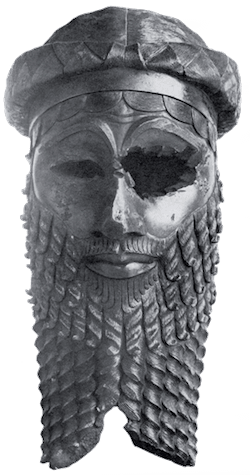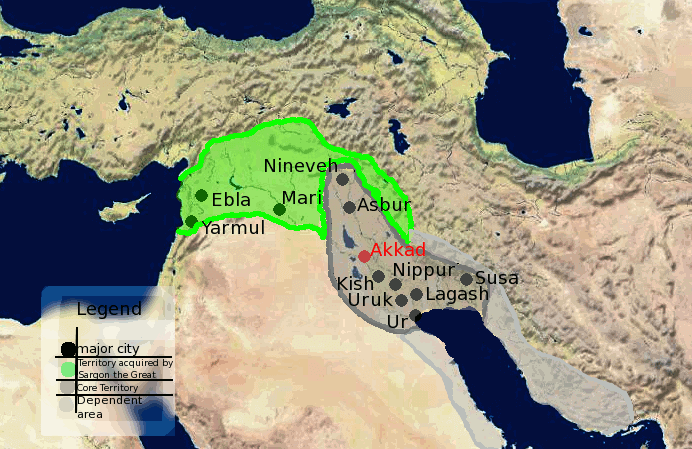People > Sargon the Great
Sargon the Great
Background
Sargon the Great (c. 2334–2279 BC) was the first person to establish what we now consider an "empire" through the conquest of Sumer that peaked during the Battle of Uruk. The new entity was called the Akkadian Empire and spanned from the Tigris and Euphrates rivers to the Persian Gulf to the Mediterranean Sea.

Sargon the Great Bronze Head -
None of the real facts around the origins of Sargon are known. Many of the stories about his birth have been written down many years after his death and there are no contemporary records discovered yet. So while this is the mythical origins of Sargon, it may later prove otherwise if new discoveries are made. It should be noted that Sargon is not a "divine" person, as he is considered secular and merely helped the gods.
Origins
The legends state that Sargon was born to a important priest mother who lived at Azupiranu and was an illegitimate child whose father is unknown. She crafted a reed basket and sealed it with bitumen before sending him down the river. As you will notice this is nearly the same story as the biblical story of Moses. In fact, it is without a doubt that the origin myth for Sargon was the direct source and inspiration for this part of the biblical tale.
During the early years of Sargon's life the area of southern Mesopotamia was populated by the Sumerians and their civilization of Sumer. According to the legends Sargon washed up near the city of Kish and was found by a royal gardener. Sargon was taken in by the gardener and raised as his own son. Eventually as he grew he became favored within king Ur-Zababa's royal court and was eventually given the position of royal cup bearer.
While this may not seem like a big position in modern day society, the cup bearer was the one who poured the kings drinks and was one of his closest advisors. He had to be trusted not to poison the king and this position was highly regarded. So how did a man of no ancestry, no wealth and no connections work his way up to this position? Some believe it was simply by merit.
Following an unusual dream where Sargon said a women drowned king Ur-Zababa in a river of blood, the king plotted to have him murdered. In ancient Sumer dreams were believed to be the gods coming to you and giving you advance knowledge about an event. The king began consulting with his court in order to have Sargon eliminated quietly. This may have been since the rule over the city was not total and he was actually a vassal of a larger entity.
This part of the story has been corroborated by a clay tablet found delivered to the king of Uruk.
Becoming King
It must not have been successful because the next recorded event is that Sargon is the king of Kish. No wealth, no bloodlines and no political connection other than the story and Sargon is still a young person yet he comes into ruling one of the major cities of Sumer.
Battle of Uruk
Following his defeat, Sargon led Lugal-Zage-Si to the ancient city of Nippur in order to confirm his rule at the Temple of the High God. This was a religious process that authorized kingship and granted more power and legitimacy to a king. In fact, it is during this time period that the name "Sargon" is even mentioned. Before this his original name is unknown and it was most likely changed when he became king. His throne name in ancient Akkadian word sharu-kanu and meant "legitimate king"
Following this Lugal-Zage-Si was most likely put to death as he does not appear in history again. Sargon was about to consolidate his power following this and was able to further his conquests by taking Ur and Lagash. In doing all of this Sargon formed the first empire believed to have existed, known as the Akkadian Empire.
Akkadian Empire
Following his victories in consolidating power in the Tigris and Euphrates region he began to focus his military campaigns and expansion elsewhere.
First War Crimes
Kazallu - wholesale devastation completely razed the city so bad.
"He [Sargon] marched to Kazallu and turned Kazallu into a ruin heap, so that there was not even a perch for a bird left."
Chronicle of Early Kings
Sargon continued to conquer all the way to the Mediterranean Sea where he was seeking the Cedar Forest of ancient Lebanon and the legendary Silver Mountains (Taurus Mountains). Following these conquests he set up lucrative trade colonies here that would later provide the foundation for the formation of Assyria after the collapse of the Akkadian Empire.
However, his military campaign in the west would be cut short when neighboring Elam decided to take advantage of Sargon's absence and siege his empire. Elam was governed by four kings who all joined together to try and take on Sargon but ultimately failed. Sargon defeated them in battle and sacked Elam. He made the territory one of his provinces and changed the official language to Akkadian.

Akkadian Empire Territories Map
This was the final conquest of Sargon and the completion of his empire. According to a later text that described Sargon's newly cemented empire it:
... had neither rival nor equal. His splendor, over the lands it diffused. He crossed the sea in the east. In the eleventh year he conquered the western land to its farthest point. He brought it under one authority. He set up his statues there and ferried the west's booty across on barges. He stationed his court officials at intervals of five double hours and ruled in unity the tribes of the lands.
Chronicle of Early Kings
According to the historical texts however, as Sargon got older eventually all the other kingdoms revolted against him and sieged the city of Akkad. Sargon defeated the rebellion and executed the instigators. Following this he invaded the city known as Subartu or Ashur and they submitted to him.
He brought their possessions to Akkad and continued to rule. However, according to the texts this assault angered the god Marduk which brought famine to the city. However, in ancient times famines were always attributed to the misdeeds of the king, much like we blame our "president" for "not creating jobs". Sargon ended up dealing with this revolt as well as living into his 70's before he died in 2279 BC.
Legacy
Sargon would pass on rule to his son but his successors were not the military commander and ambitious man that Sargon was. Eventually the Akkadian Empire fell to the Gutium who came down from the Zagros Mountains and plunged Mesopotamia into a dark ages.
The Akkadian Empire was a prosperous state built upon trade and agriculture. They had great irrigation works and built a great civil organization to administer the empire. The Akkadian Empire was also the first civilization to maintain a standing army of trained soldiers. They had a complex road and postal system that was run by the state and they also did early property surveys to determine who owned what land.
Sargon was also instrumental in establishing the earliest concepts of a library where he stored ancient myths, astronomical knowledge and all other sorts of wisdom and information. The language of Akkadian become the common spoken language in Mesopotamia and the language of cuneiform became increasingly relegated to scholars and academics before eventually going extinct.
One of the most lasting legacies of Sargon's reign however, was the model of kingship that he created which would be passed down for the next couple thousand years until Alexander the Great came and deposed the Achaemenid Empire. Rulers from all over Mesopotamia tried to emulate Sargon and repeat his successful rule, often incorporating many of the elements of his empires construction into their own. Sargon himself may have even predicted this.
Through Sargon's conquest his sister also rose in fame and popularity, becoming the high priestess of the temple and one of the first recognized poets. The hymns and works she wrote would influence Mesopotamia culture in Assyria and Babylonia for centuries and millennia to come.
They discovered the lost art of wax-casting for creating statues and were the first civilization to make statues out of lead.
Not bad for the illegitimate son of a gardener.
Hanging Gardens
It is important to note that gardens play a central role in the story of Sargon and can be interpreted to being a staple of Mesopotamian culture going back all the way to Sumer. According to the history texts, once Sargon completed his vast conquering of territory he had plants from all over the empire brought to his palace. He built a beautiful garden in Akkad and ruled for 56 years.
So could the idea for the Hanging Gardens of Babylon go back even further than initially suggest? Its hard to juxtapose the image of Sargon the Conqueror with Sargon the Gardener but it indeed was true.
Sources
Primary Sources
History Archive: Sargon Text
History Archive: Chronicle of Early Kings